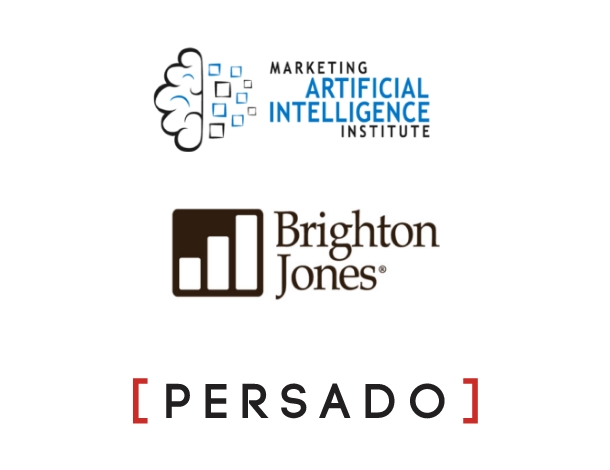July 14, 2022
Brighton Jones’ CMO Uses AI to Enhance Marketing Personalization
By Liza Colburn

In a recent episode of our CMOs series, Paul Roetzer sat down with John Dougherty, CMO of Brighton Jones, for a discussion on how AI is changing the marketing landscape at Brighton Jones.
Brighton Jones provides a combination of investment management and financial planning services. As one of the largest financial planning organizations in the United States, the company aims to save its customers time, help them uncover new income opportunities, and minimize financial surprises.
Despite the organization’s popularity, Dougherty believes that the customer experience can always improve. As Brighton Jones’ chief marketing officer, Dougherty is leading the charge of using AI to enhance Brighton Jones’ services.
How Brighton Jones Uses AI to Connect With Audiences
AI in marketing is still a relatively new venture, and it’s often up to individual organizations to determine how they can best utilize cutting-edge technologies like AI. While this may sound like a hindrance, this lack of a one-size-fits-all solution allows more room for creativity and customization. Whether it’s developing customer-facing tools or finding new ways to segment their data, Dougherty’s team keeps their focus on using AI to create value at every stage of the Brighton Jones customer journey.
AI for Customer Segmentation
When you have AI on your side, there’s no need to take the traditional approach to building buyer personas. Brighton Jones has been using AI to segment customers based on common demographics or buying behavior, with the goal of generating more MQLs and SALs.
Segmentation is possible without AI, but this time-consuming process can dry up resources if done manually. With AI, Brighton Jones can look across hundreds of customer attributes, finding groups that are homogeneous, distinct, and actionable.
Dougherty has also found that it’s human relatability that helps you get the results you want on Google search, which is why his team uses NLP (natural language processing) to analyze customer affinities.
Affinities are based on consumers’ habits and interests. In Brighton Jones’ case, affinities include funding for education and financial guidance for their children. By combining affinities with predictive modeling, Brighton Jones’ team can make sure they’re only showing consumers the content they want to see. This leads to better storytelling, which can lead to higher engagement rates.
Dougherty believes he will use AI for additional tasks in the future, but is ready to acknowledge just how new — and humbling — this experience is.
“The learning curve has a long, long, long, long way to go; every week is a new gotcha,” Dougherty explains. “But I think we finally turned a corner and I realized the investment is going to be well-worth it. It’s just going to really take us to a level that, honestly, I just don’t think our competitors can go.”
Bringing the Data Together
For Brighton Jones, building a customer data platform that helped them consolidate data sources was at the top of their priority list. They began their customer data platform (CDP) journey using a solution specifically designed for marketing.
The first stage of product adoption required unifying data from all of the marketing tools they use, including Salesforce and Marketo, along with the company website and their phone system. Next they had to siphon through all of this data, some of which was incomplete or redundant, and manually decide which information should be classified as useful.
After a Brighton Jones marketing automation specialist ensured the data they received was clean, the team realized they wanted more data to create even more personalized experiences for customers. The Brighton Jones team continues to use the AI tools that are built into their CDP to do even further customer segmentation.
The team is also working with data scientists to learn more deeply about how AI works and where they can further implement it into their marketing efforts. For instance, Brighton Jones has developed a behavioral score for customer engagement. This gives them the ability to create highly-personalized content, such as emails, where even the links to articles or offerings vary based on the targeted individual.
AI and Privacy
The potential for AI is endless, Dougherty explains, but for it to be successful, it has to gain the trust of the audience you’re targeting. Brighton Jones has decided the best way to gain consumer trust is by not using third-party data.
Instead, the company is building out their first-party data (data collected directly from customers). Brighton Jones tries to deeply understand what their customers would like their data to be used for, and use that information alone to make marketing decisions. Data AI automation can be done in a way where it’s respectful of privacy and adds huge value to businesses and consumers, but the inverse is true as well.
As Roetzner expertly states, “We can make marketing better. But if we don’t make it more human in the process — if you don’t use personalization to create better relationships and not take advantage of people because you have their data — then we’re doing this for nothing.”
Interested in using AI to enhance your marketing team’s creative output? Learn more about our solutions here.


